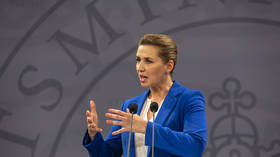Denmark sacrifices public holiday to pay NATO bill

Denmark’s newly-formed coalition government has opted to do away with one of the country’s 11 public holidays to help reach NATO’s annual defense spend target of 2% of GDP, despite criticism from religious Danes.
“There is war in Europe, and we need to strengthen our defenses,” Prime Minister Mette Fredriksen explained on Thursday when asked why she was scrapping the holiday on the new government’s first day in power. “That will require everyone to contribute a little more.” She said she hoped the measure would boost productivity and economic activity.
Meeting NATO’s spending target three years ahead of schedule is one of the top priorities of the coalition government, which took power on Thursday. Comprised of the center-right Liberal Party and the centrist Moderates in addition to Fredriksen’s center-left Social Democrats, the coalition is Denmark's first in nearly half a century to include parties from both sides of the political spectrum.
While the new government has explained the decision, some Christians have taken issue with the actual holiday that is being excised from the calendar. Store Bededag (“Great Prayer Day”), observed on the Friday before the fourth Sunday after Easter, has been celebrated by Danes since 1686 and is traditionally a big day for confirmation ceremonies.
Roskilde Cathedral's Dean Sophie Olander condemned the government's move, telling local outlet TV2 “We need holidays, as gathering times to get down to speed and have time for prayer and reflection. It is a shame to have a society where you think it is not important.”
Fredriksen called a snap election in October after a report describing her government’s November 2020 decision to slaughter millions of minks on fur farms due to fear of Covid-19 triggered popular outrage. While her party won the most votes last month, she initially tendered her resignation to Queen Magrethe, claiming to want a broader governing coalition. Instead, her party’s coalition partners opted to retain her as PM and dropped their calls for an independent legal inquiry into the cull.
Copenhagen admitted a week after ordering the destruction of the country’s entire mink population that there had been no legal basis for the directive and that improper disposal of the bodies had likely contaminated groundwater.













